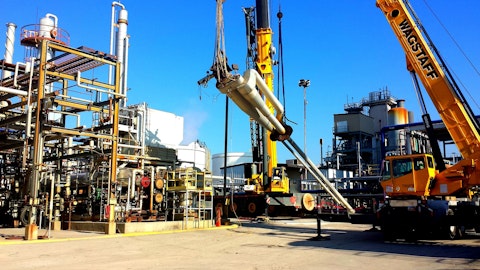Leonardo Marcondes: Good morning. Thank you for taking my questions. And I have two questions. Just a follow-up based on what Duarte has just asked. First, I would like to know more about Ipiranga and the market. Could you please tell us about the availability of products in the market? And how availability affects your strategy of commercialization for clients, which are more when it comes to the spot margin? The second question constraints Ultragaz. I’d like to ask you to tell us more about bulk. We’ve seen this bulk segment has gained more and more relevance in terms of volume. Would you please elaborate on how this segment has impacted your margins, and what are the competitive advantages of Ultragaz in this specific segment? Now piggybacking on Duarte’s question Linden said that July was marginally better than June. So June, was it a more challenging month or was it more positive to Ipiranga within the second — the third quarter?
Marcos Lutz : Good morning. Your questions about availability is very timely. Ipiranga has no problem of product availability. Ipiranga has no problem of supplying regular customers. And I don’t anticipate anything that would say, we eventually would get problems in supplying our regular customers. We keep on working in the spot market, and that’s quite lagging the branded ones, but the spot market is much more exposed to international prices, because it’s a marginal molecule so to speak. There will be occasions in which unless the market has a pricing answer that justifies the international costs, it would be very difficult to develop a segment. Brazil has just settling down in this model and we are still actively involved in it but understanding that this is a market that is more exposed to international prices.
And once again, because this is a very important point, I cannot speak of all suppliers in Brazil, but concerning Ipiranga, there is no problem of supply. No problem of shortage of product. Now concerning the month of July, as I said, July was marginally better for Ipiranga. But a very small improvement considering what we expect for the whole industry. We’ve been dealing with lot of challenges and trying to come up with solutions that can offset market difficulties. But said July was marginally better compared to June and to May.
Tabajara Bertelli : Hi Leonardo, this is Tabajara speaking on behalf of Ultragaz, about our position in bulk. This is a long-term journey, you probably know and for both segments. But focusing on bulk, I think, there are two possibilities here, things that we’ve been focusing consistently. We want to be close to our customers. We want to understand and realize what their needs are. We’ve been launching new solutions for customers and that has meant significant improvement. You’ve also aware of recent investments, which have led to operational efficiency. Things which are really relevant to us, and we want to expand, but we’ve operational efficiency quality of operation. This is a long-term process. There’s still a lot to be done. But this is one of our focuses here, and we’ve been paying close attention to it.
Leonardo Marcondes: Great. Thank you very much for your answers.
Operator: The next question comes from Regis Cardoso of Credit Suisse.
Regis Cardoso: Hello. Good morning. I have some questions to Linden, but there is also a follow-up of this last topic. Trying to look towards the future Linden in your answer you said that, the spot market is a market which has prices based on international scene. And my question is what have you anticipated in terms of domestic supplies considering this context where we can see that discrepancy of the price volatility and how it’s incorporated by Petrobras. It is a market which is still short and it needs importation to supply some specific regions where there is less refining capacity especially in the North and Northeast of Brazil. So Linden tell us, how you anticipate the supply in the future and how to get adapted to it?




